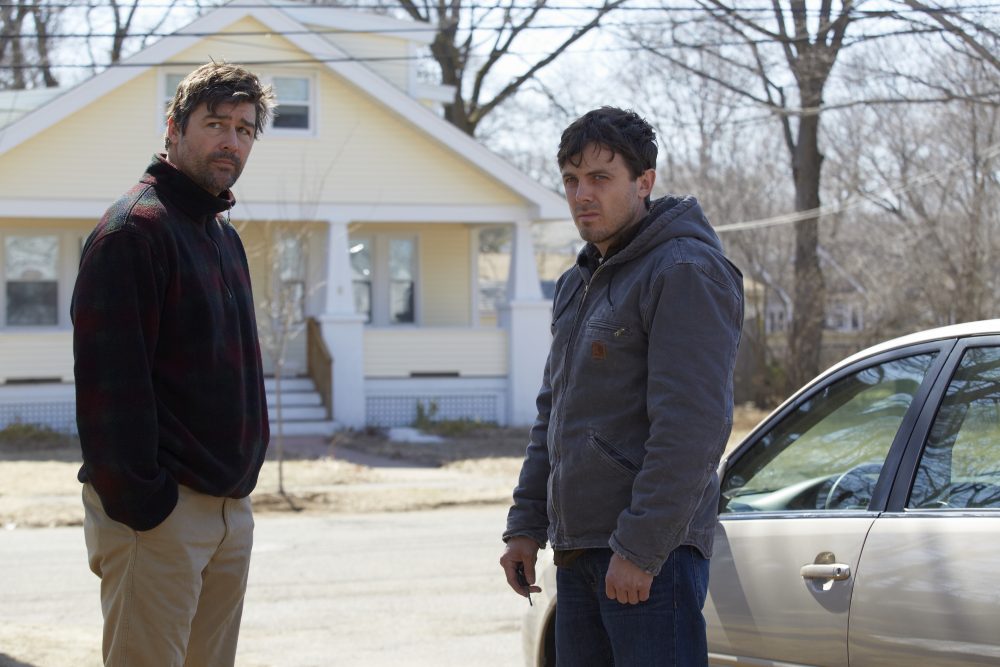Advertisement
'Manchester By The Sea': Love, Loss And The Pitilessness Of New England Winters

One of the cruelest things about tragedy is that the world doesn’t stop turning. No matter how devastated you may be, life goes on in a million pesky, annoying and sometimes inappropriately funny ways.
This isn’t something movies typically tend to acknowledge, unless we’re talking about the films of writer-director Kenneth Lonergan, where laughter and grief come crashing together in big waves of unpredictable emotions, often amid the most mundane circumstances. Though precisely written and sometimes overly controlled in their camerawork, these pictures convey a deeply human, moment-to-moment instability — like those times when you find yourself crying in the middle of the day for no reason at all, or trying to suppress a giggling fit at a funeral.
You probably remember the New York playwright’s astonishingly assured 2000 film debut, “You Can Count on Me,” which gave Laura Linney her first real leading role and launched the career of a young, unknown actor named Mark Ruffalo. Or perhaps you might have read something about the six-year battle over his long-delayed and mucked-with follow-up, “Margaret,” a compromised and incoherent edit of which was quietly slipped into theaters back in 2011. (Lonergan’s preferred cut, some 36 minutes longer and boasting a radically different sound design, is at long last available to stream.)

The writer-director’s third film, "Manchester by the Sea," splits the difference between "You Can Count on Me’s" insular family melodrama and the sprawling, cosmic concerns of "Margaret." It’s a small story that contains multitudes. "Manchester by the Sea" is about love, loss and the pitilessness of New England winters. It’s about the things we forgive, and things we can’t forgive ourselves for. This is a movie about the slow process of moving on after tragedy and about how some of us refuse to heal. It’s also about forgetting where you parked the car on a freezing-cold day, and the logistical difficulties of getting laid when you’re in high school. Like I said, multitudes.
Casey Affleck stars as Lee Chandler, a surly janitor we first meet shoveling snow in Quincy. Lee mouths off a lot at work and spends most nights curled up at the bar waiting for someone to give him an excuse to throw a punch. He’s closed-off, shut-down and seems to drift away even more before our eyes upon receiving word that his brother Joe (Kyle Chandler) has died of congestive heart failure. Lee returns to his North Shore hometown of the title, where everybody stares and whispers behind his back. ("Is that the Lee Chandler?" "You know that story’s bulls---, right?") We can see how much he hates being home, but there are arrangements to be made.
"Manchester by the Sea" excels at the depiction of such arrangements in ways I’ve never seen in a movie. It zeroes in on managing practicalities at a time of grief and our reliance on rituals that, when looked at askance, can indeed seem quite strange. Joe’s teenage son Patrick (Lucas Hedges) asks his Uncle Lee why the funeral director is acting so sad: "Doesn’t he know that we know he does this every day? Who does he think he’s fooling?"
Advertisement

Patrick’s mom was a drug addict who is long out of the picture, but Lee is still stunned to learn that Joe’s will requests he step in as the boy’s legal guardian. To say that this sullen, broken-down alcoholic isn’t exactly ready to parent is something of an understatement. But "Manchester by the Sea" has a parallel track of flashbacks running along throughout, where we see that Lee wasn’t always this way. We watch warm and funny, long-ago scenes with his wife Randi (Michelle Williams) and brother Joe, so the first half of the movie works like something of a mystery. You’re wondering what possibly could have happened to turn this gregarious guy into such a hollowed-out husk of a man, and then when we find out it’s so much worse than anything you expected.
Yet somehow at the same time it can’t be overstated how funny this movie is. “Manchester by the Sea” would probably be hailed as one of the year’s best comedies if everybody in the audience didn’t spend half of it sobbing. Unlike his sad-sack uncle, Patrick has got it all together. He plays hockey, he’s in a (hilariously terrible) band and sneaks back and forth between two girlfriends. The last thing he needs is some distant loser relative coming in and screwing everything up by making him move to Quincy, of all places.
Lonergan nails the gruff, emotionally constipated way that men of a certain stripe (particularly here in the Northeast) express a complex array of emotions exclusively through busting each other’s chops. Affleck and Hedges have a crackling chemistry, constantly one-upping each other with profane put-downs that grow more affectionate as the movie wears on. Turns out there are a thousand ways to tell someone to go eff themselves, and some of them can even move you to tears.

Soon-to-no-longer-be the most underrated actor of his generation, Casey Affleck delivers a towering performance, impeccably precise yet lived-in and true. We see Lee at so many emotional extremes, but Affleck never succumbs to histrionics. He keeps throwing up walls that keep getting torn down throughout the film, only occasionally allowing us tiny glimpses of the shattered soul hiding inside, unable to stand himself. The feel-good pop myth in movies like this is that once the healing begins everybody lives happily ever after. But the truth is that some people are too broken to ever be put back together, at least not all the way.
The only misstep is the soundtrack. Lonergan’s penchant for classical music was fine in the Upper West Side milieu of “Margaret,” but rings false in a blue-collar setting. Handel is an ill-fit for these Springsteen people, and a mid-movie blast of Albinoni’s Adagio in G Minor is cranked so high in the mix it nearly drowns out and distracts from crucial scenes we’re trying to watch.
But maybe that’s part of his point. "Margaret’s" controversial sound design often prioritized passersby and ambient chatter, burying the protagonist’s perspective as just one tiny voice amid a larger, bustling New York City. "Manchester by the Sea" finds less audacious (or at least less obnoxious) ways to continually assert the messiness of life continuing on, undeterred by the Chandler family’s pain. Whether that’s a cellphone vibrating at a funeral or a malfunctioning stretcher that won’t fit in the damn ambulance, the Cape Ann tide rolls in and then washes back out again.
This is a great film.

